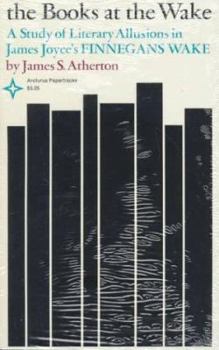The Books at the Wake: A Study of Literary Allusions in James Joyce's Finnegans Wake (Arcturus Books, 126)
Select Format
Select Condition 
Book Overview
InFinnegans Wake Joyce uses world literature, great and small, sacred and profane, as one of the most important and frequent of his sources. Setting out to explore these literary allusions, Mr. Atherton sheds a great deal of light upon other aspects of Joyce's work. Entire chapters are devoted to such major figures as Swift and Lewis Carroll, while less important influences are grouped together under such headings as "The Irish Writers" and "The Fathers of the Church." He also surveys the various interpretations of Finnegans Wake, and makes use of the Letters of James Joyce and the manuscript of Finnegans Wake in the British Museum.
Format:Paperback
Language:English
ISBN:0809306875
ISBN13:9780809306879
Release Date:October 1974
Publisher:Southern Illinois University Press
Length:308 Pages
Weight:0.68 lbs.
Dimensions:8.0" x 0.9" x 5.0"
Customer Reviews
3 ratings
Reference required
Published by Thriftbooks.com User , 25 years ago
Atherton's book is "absotively" wonderful. Appreciating the Wake certainly requires this book. Numerous linguistic influences on Joyce from various authors are catalogued. Particularly interesting is the lengthy analysis of Lewis Carroll's literary influence on Joyce: 1. Carroll is presumably the undisputed inventor of the portmanteau word - a word packed with multiple meanings. Carroll was content to have dual meaning but Joyce packed as many meanings as possible into his words. 2. Carroll (like Joyce) worked with successive alterations of one letter in a word - meat, meet, mate, maze, etc. Sections of the Wake which obliquely referenced Carroll would routinely incorporate this technique. 3. Alice served as an alterego for Joyce's heroine ALP, where "Wonderlawn" is code for the Garden of Eden. In short, Joyce found much in Carroll's work that (in the case of the portmanteau word, to his surprise) neatly "dovetallied" with his own "work in progress". The Books at the Wake is a fascinating and well-written collection of many more such analyses (Shakespeare, Blake, Vico, etc.).
A helpful "tour guide" through Finnegan's Wake
Published by Thriftbooks.com User , 26 years ago
Atherton's book helped me begin to understand Joyce's "copy/paste" style. His preface provides an excellent philosphical framework within which the Wake can be understood. His chapters that follow explain in great detail how Joyce used the works of Vico, Swift, and the world's sacred books to construct his masterpiece. Atherton goes on to cite and explain hundreds of Joyce's literary references in Finnegans Wake. This is a good book for any James Joyce fan.
One of the 10 best books on the subject.
Published by Thriftbooks.com User , 27 years ago
I have been checking the first edition of this book out of my library for months, and am delighted to see a paperback edition in print. It's one of the indispensible guides to the Wake, and I'm glad to see it readily available.





